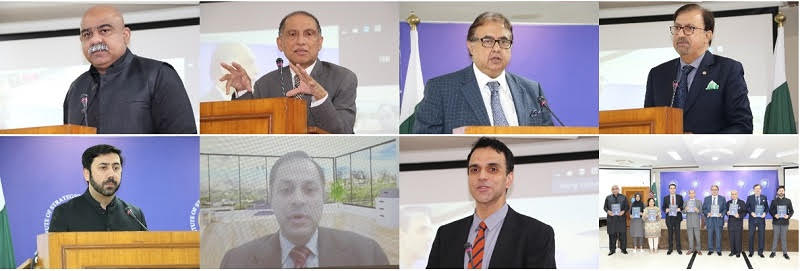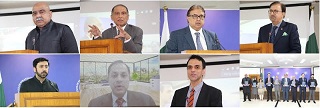Press Release
ACDC Special Report Launch
“Comprehensive National Security and Emerging Technologies”
August 18, 2022

The Arms Control & Disarmament Centre (ACDC) at the Institute of Strategic Studies Islamabad (ISSI) launched a Special Report titled “Comprehensive National Security and Emerging Technologies” on August 18, 2022. Ambassador Raza Bashir Tarar, Special Secretary (PP & PD), Ministry of Foreign Affairs was the Chief Guest for the launch event.
In his address, Ambassador Raza Bashir Tarar said that the militarisation of emerging technologies is posing novel risks and fuelling an arms race among major powers. They are creating non-linear and less predictable conflict escalation dynamics, which could undermine the strategic stability in South Asia. Therefore, there is a need to identify an alternative conflict resolution mechanism, as the existing CBMs do not address the risks emerging technologies are posing. He also stressed bridging the gap between academia and policymakers, containing the national brain drain, improving national tech ecosystems and promoting R & D and public-private partnerships. “Pakistan must sensitise the global community about the damaging effects of these technologies and the necessity for an international regulatory regime,” he said.
In his welcome remarks, Ambassador Aizaz Ahmad Chaudhry, DG, ISSI discussed the scheme for the first half of the year for all centres including the ACDC. He commended the team of ACDC for their efforts regarding this report.
Earlier in his introductory remarks, Malik Qasim Mustafa, Director ACDC, said that emerging technologies are providing us with endless possibilities to achieve progress, growth, peace and prosperity and a sustainable future. Pakistan strongly believes that the application of emerging technologies is set to reshape the future and can play an important role in achieving the goals of comprehensive national security – social, economic, human and traditional security.
While expressing his views on the topic, Air Commodore (Retd.) Khalid Banuri, former Director General ACDA, Strategic Plans Division, said that the development of emerging technologies is outpacing the formulation of the international regulatory regime. Unless the ethical concerns are addressed, the emerging technologies will continue to drive military doctrines. Maintaining the human-machine interaction, ensuring adequacy and credibility of data, bridging the generational gap, identifying and countering disinformation, and planning the technology integration in the military and civilian domains are a few key issues.
While setting the context for the existing debate on emerging technologies, Dr Hussain Nadim, Executive Director (C & R), Islamabad Policy Research Institute (IPRI), said that we are living in a world where the reality of technology is stranger than the fiction of our time. While highlighting the need for a paradigm shift, he said that one could not handle the technologies of the 21st century with the 18th-century strategies. He left the audience with thought-provoking questions about the future, challenges to narratives as well as evolving concepts of security.
In his remarks, Mr Khawaja Mohammad Ali, Head of Technology Strategy, Governance & Cybersecurity at the National Bank of Pakistan, shed light on evolution in the economic domain and other opportunities while acknowledging the challenges of technology as a “double-edged sword”. He stressed the need for indigenous developments in key areas, such as cyber-space sovereignty and neutrality of the Internet of Things.
In the roundup, Mr Usman Jadoon, Director-General, UN Division, Ministry of Foreign Affairs, spoke about military as well as peaceful uses of emerging technologies. Talking about the need for redressal, he emphasised how it is not just for economic viability but essentially an issue of survival. He highlighted the evolution of the global threat landscape and required regulatory mechanisms. Interim arrangements are necessary as treaty negotiations take time.
The event concluded with the presentation of momentos to the Chief Guest and speakers by Ambassador Khalid Mahmood, Chairman, Board of Governors, ISSI.













